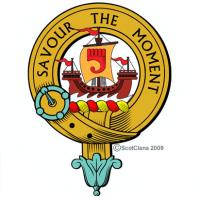
Clan Duncan
Clan Duncan People
 Adam Duncan, 1st Viscount Camperdown (1731-1804)
Adam Duncan, 1st Viscount Camperdown (1731-1804)
Born the second son of Dundee’s Provost, Alexander, Adam Duncan joined the navy in 1746. After seeing action in Brest and Havana he was by 1795, an Admiral and Commander in Chief in the North Sea.
He was the vexation of the Dutch and successfully blockaded their trade routes at the Texel. In 1797 he defeated Admiral de Winter and his Dutch fleet at Camperdown. For this he was created Viscount of Camperdown in 1797.
Andrew Duncan (1744-1828)
After studying at St Andrews University, Andrew Duncan began his medical carreeer in Edinburgh, working for the improvement of treatment and respect for the mentally ill. In 1813 he established a hospital for the mentally ill in Morningside. From 1773, he was editor of the “Medical and Philosophical Commentaries”.
Jonathan Duncan (1756-1811)
First arriving in Calcutta in 1772 as a writer for the East India Company, Duncan became close to Warren Hastings, Governor-General of Bengal. By 1795 he was Governor of Bombay, a post he held for sixteen historically-important years. A monument was raised at St Thomas Cathedral Bombay to his memory.
John Duncan (1866-1945)
When Edinburgh’s Celtic Revival movement developed in the late 1800s, John Duncan was its foremost artist. He was born in Dundee and studied in Holland, absorbing many European influences there. He worked with Sir Patrick Geddes, assisting with the journal ‘The Evergreen’.
He went to America in 1901 to be Associate Professor of Art in Chicago for three years. After this he settled in Edinburgh to concentrate on his painting. Treating Celtic mythology with classical techniques, his later work included representations of fairies he claimed to see on visits to Iona.
 Helen Duncan (1897-1956)
Helen Duncan (1897-1956)
Helen Duncan was born in Callander in Perthshire. She was a well known medium living in Portsmouth during World War Two. She has become notorious as being the last person in the UK to be convicted under witchcraft laws.
In 1941, the spirit of a sailor reportedly appeared at one of her seancés announcing that he had just gone down on a vessel called the Barham. HMS 'Barham' was not officially declared lost until several months later, its sinking having been kept secret to mislead the enemy and protect morale.
Mrs Duncan was arrested and convicted under the Witchcraft Act of 1735. In recent years a strong movement has gathered momentum to have her pardoned as compelling evidence exists that the sinking of the vessel was common knowledge in the naval town of Portsmouth at the time.








